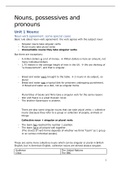Nouns, possessives and
pronouns
Unit 1 Nouns:
Noun-verb agreement: some special cases
Basic rule about noun-verb agreement: the verb agrees with the subject noun:
- Singular nouns take singular verbs
- Plural nouns take plural verbs
- Uncountable nouns they take singular verbs
But there are exceptions:
- A million dollars is a lot of money. Million dollars is here an amount, not
many individual dollars
- 1,75 meters is the average height of men in the UK. We are thinking of
“a measurement”, and that is singular.
- Bread and water were brought to the table. 2 nouns in de subject, so
plural
- Bread and water was a typical diet for prisoners undergoing punishment.
Bread and water as a diet, not as singular items.
Plural titles of books and films take a singular verb for the same reason:
- War and Peace is a great Russian novel.
- The brother Karamazov is another.
There are also some singular nouns that can take plural verbs = collective
nouns (because they refer to a group or collection of people, animals or
things:
Collective noun + singular or plural verb:
- The team has reached the number 1 position.
- The team have all played well together.
(The choice of verb forms depends of whether we think “team” as 1 group
or as various individual people).
These are some more collective nouns which can be singular or plural in British
English, but in American English, collective nouns are almost always singular.
Audience The United Nations
Class The BBC
1
, Company Microsoft
Family
Government
Group
Review 1: Countable and uncountable nouns
- Most nouns have a singular and plural form they are countable (1 hand,
2 hands)
- But water Is uncountable
Uncountable nouns:
- Materials: Cotton, plastic
- School subjects: geography, math’s
- Ideas and feelings: beauty, love
- Activities: shopping, tennis
- Groups of things: furniture, money
Uncountable nouns have no plural form so need a singular verb
- Cotton is a natural material.
- Math’s is a useful subject.
Don’t use a/an with uncountable nouns !
- Cotton is a natural material.
- Math’s is a useful subject.
- We need to buy a bread.
- We need to buy some bread.
- We need to buy a loaf of bread.
Review 2: Nouns that can be countable or uncountable
If I want to read one of these, should I ask for:
A paper or Some paper?
If I want to do some writing should I ask for:
A paper or Some paper? Or A piece of paper
Some words can have a countable and an uncountable meaning:
- Countable: A paper
2
, (= a newspaper or a document)
- Uncountable:
(=material)
- Countable: 2 coffees
(= two cups of coffee)
- Uncountable: Coffee/some coffee
(= the drink or the beans or powder for making it)
- Countable: A glass
(= a thing that we drink from)
- Uncountable: Glass/some glass
(= the material in windows)
- Countable: A work
(= a painting, a book, etc.)
- Uncountable: Work
(= employment, study, etc.)
- I want a work that pays well.
- I want work that pays well.
- I want a job that pays well
Unit 2 Possessive ’s:
Possessive’s
First question: Where do we put the possessive ‘s when there are 2 noun linked
with “and”? Which is correct?
- Let’s go to Peter and Mary’s house.
Peter and Mary’s as one unit, one house.
- Let’s go to Peter’s and Mary’s house.
- Peter’s and John’s houses are very different.
Peter and John are not 1 unit, it are 2 different houses.
Second question: Where do we put the ‘s in prepositional phrases?
- The rear left wheel of the car in front fell off.
- The car in front’s rear left wheel fell off.
We don’t put the ‘s after the noun, we put the “‘s” it after the prepositional
phrase.
Third question: Can an adjective go after a noun with the possessive ‘s?
3
, - I really like my friend’s new car.
- I really like my new friend’s car.
Both are correct but the meaning is different
(The first sentence: a new car, the second sentence: a new friend)
If the possessive “‘s” answers the question “what kind of?”, the rule is different
There are some new men’s jackets in the shop.
The word “men’s” tells us what kind of jackets they are, not who’s jackets
they are. The 2 nouns: men’s and jackets belong together, so the
adjective must come first.
Unit 3 Possessive with ‘s or of?
Possessive with ‘s or of?
- The front page of the newspaper
- The newspaper’s front page
The same meaning, both are correct, this is usually true when we talk
about things that are man-made. That includes, machines, buildings,
organizations, countries and cities:
- The policies of the government
- The government’s policies
The same meaning, both are correct. The “of” structure is more common
in academic and formal writing. The “’s” more common in speech.
But there are some cases where 1 is much more usual than the other:
‘s for people’s names, especially people we know and short names:
- John’s home
- (The home of John)
But
- William Shakespeare’s home
- The home of William Shakespeare
But with fames people, especially when we use their full name, than we
can use both forms
‘s for people and most living things, especially in the sense of possession:
- The manager’s office
- Someone’s handbag
- An ants’ nest Ants ends with an “‘s” so we put the postrofé after the s
‘S for time words
- Yesterday’s meeting
- Today’s newspaper
But of with dates
- The agreement of 12 September
4




